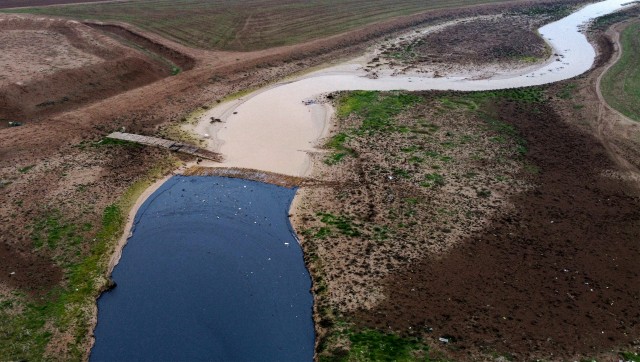In northeastern Syria, farmer Nizar al-Awwad has stopped using a local river for irrigation because it has become contaminated by an oil leak, which locals and officials in the region controlled by Kurds attribute to Turkish strikes. “All the farmers in the area have stopped using the river for irrigation,” said Awwad, 30, from a village near Tal Brak, in Hasakeh province. “We’d be killing our land with our own hands if we used the polluted water,” he said. Standing near his wheat crops, Awwad added, “Farmers already suffer from a lack of fuel and drought – the polluted river has only added to our woes.” Since the civil conflict in Syria began in 2011, there has been increasing worry over oil pollution, which has damaged infrastructure and resulted in opposing powers vying for control of the country’s energy resources. Residents of Hasakeh province told AFP that when Turkey targeted Kurdish-affiliated oil infrastructure, including stations and refineries, last month, they became aware of the oil slicks in the river that feeds into the region’s lifeline, the Khabour River. Farmers who are already trying to make ends meet due to 12 years of conflict, the worsening effects of climate change, and a difficult economic crisis that has resulted in extended power outages and fuel shortages are now even more suffering as a result of the spill. Turkey said it hit dozens of targets in northern Syria and Iraq belonging to the Kurdistan Workers’ Party (PKK) and the People’s Protection Units (YPG) after nine Turkish soldiers were killed in clashes with suspected Kurdish militants in Iraq. ‘Turkish bombardment’ Turkey and many of its Western allies have blacklisted the PKK as a “terrorist” organisation, and Ankara views the YPG as an offshoot of the group. But the YPG dominates the US-backed Syrian Democratic Forces, the Kurds’ de facto army in Syria’s northeast who spearheaded the fight against the Islamic State jihadist group in the country. Mohammed al-Aswad, who co-chairs the semi-autonomous Kurdish administration’s water authority, said “Turkish bombardment” in northeast Syria, particularly on Rmeilan and Qahtaniyah in the far northeast corner of Hasakeh province, “damaged oil installations and pipelines” and caused the pollution. Rudimentary traps set up by the administration have failed to limit the current spill. AFP correspondents saw oil slicks on water, plants and riverbanks across a 55-kilometre (34-mile) stretch between Tal Brak and the outskirts of Hasakeh city. While repairs to oil infrastructure were expected, authorities were advising farmers against letting livestock drink the polluted water, which could “threaten marine life and biodiversity” if it reached a dam along the Khabour river, Aswad said. But farmer Ibrahim al-Mufdi, 50, said he had already stopped irrigating his crops with the river before the warning. “The sheep can’t be drinking from the river,” he said, expressing concern over possible fish contamination. “I just hope that the rain will keep falling so we don’t have to irrigate from the river,” Mufdi said.
Oil slicks blamed on Turkish strikes blight northeast Syria river
FP Staff
• February 7, 2024, 12:32:19 IST
Since the civil conflict in Syria began in 2011, there has been increasing worry over oil pollution, which has damaged infrastructure and resulted in opposing powers vying for control of the country’s energy resources
Advertisement
)
End of Article